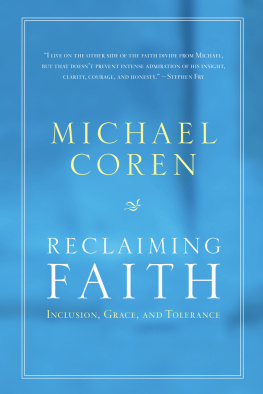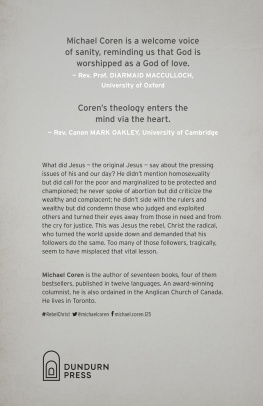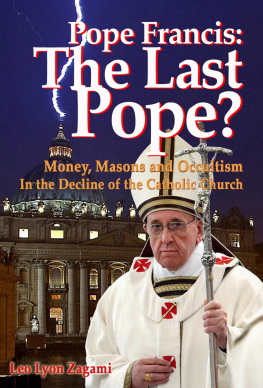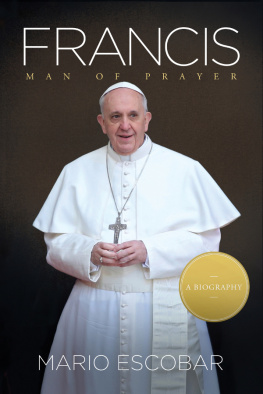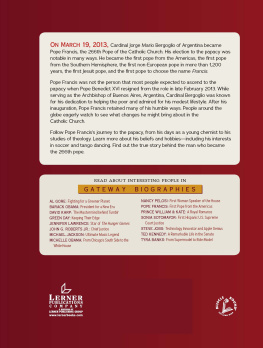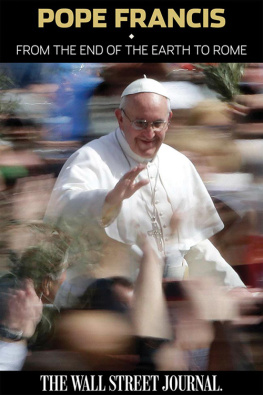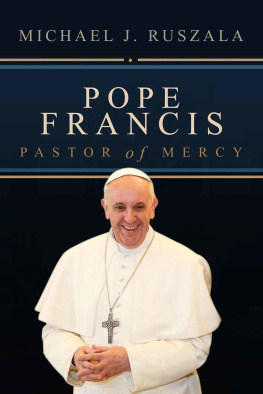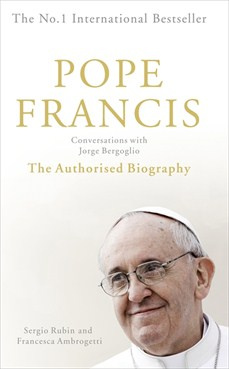ALSO BY MICHAEL COREN
Heresy (2012)
Why Catholics Are Right (2011)
As I See It (2009)
J.R.R. Tolkien: The Man Who Created the Lord of the Rings (2001)
Setting It Right (1996)
The Man Who Created Narnia: The Story of C.S. Lewis (1994)
The Life of Sir Arthur Conan Doyle (1993)
The Invisible Man: The Life and Liberties of H.G. Wells (1993)
Aesthete (1993)
Gilbert: The Man Who Was G.K. Chesterton (1990)
The Outsiders (1985)
Theatre Royal: 100 Years of Stratford East (1985)
Copyright 2013 by Michael Coren
Signal is an imprint of McClelland & Stewart, a division of Random House of Canada Limited, a Penguin Random House Company
All rights reserved. The use of any part of this publication reproduced, transmitted in any form or by any means, electronic, mechanical, photocopying, recording, or otherwise, or stored in a retrieval system, without the prior written consent of the publisher or, in case of photocopying or other reprographic copying, a licence from the Canadian Copyright Licensing Agency is an infringement of the copyright law.
Library and Archives Canada Cataloguing in Publication
available upon request
eBook ISBN: 978-0-7710-2353-8
Library of Congress Control Number: 2013938893
McClelland & Stewart,
a division of Random House of Canada Limited,
a Penguin Random House Company
One Toronto Street
Toronto, Ontario
M5C 2V6
www.randomhouse.com
v3.1
Dedicated to the Corkery Family
CONTENTS
I
Marriage
II
Abortion and Birth Control
III
Euthanasia
IV
Church and State
V
Female Ordination and Married Priests
VI
Papacy
VII
Ecumenism and New Evangelization
VIII
Pope Francis
INTRODUCTION
THE VERY TITLE OF THIS BOOK is likely to cause dissent, but then I regard that as a good and not a bad consequence. To paraphrase G.K. Chesterton, the wonderful thing about getting into hot water is that it keeps you so very clean. There are those who will be perplexed, perhaps angry, that I dare to speculate, even question, the future of the Roman Catholic Church; others who are so convinced that Catholicism has no future at all that they will scold me for dipping a few toes into waters they assume polluted to the point of near evaporation. To the former, we can question the future without condescending to the subject. To the latter to extend the Chestertonian hygiene reference dirty feet are never a good thing to boast about. The point is, however, that while the Church itself does not and cannot change in its fundamentals, the world around it, and the context in which it exists, is changing all the time. What Catholics need to do and have to do is to explain where the Church is rooted in permanent truth and why it cannot change, and also and just as boldly where the Church is indeed in need of reform, why this is the case, and how it can be achieved. When Cardinal Jorge Mario Bergoglio, Archbishop of Buenos Aires, became Pope Francis in March 2013, there were almost six thousand journalists in Rome to cover the Papal election. Some of them reported on the conclave with expertise and empathy, but others either out of ignorance or just some jaundiced agenda insisted on asking the same questions again and again, and almost all of these questions centred on the premise and title of this book. Is the Church going to change; will the new Pope be flexible; is Catholicism going to adapt to the times and alter its teaching on same-sex marriage, abortion, contraception, female ordination, celibate clergy, divorce, and so on. Interestingly, the questions centred almost exclusively on moral and sexual issues rather than directly theological topics, and they were almost all based on the stubborn, virtually religious (forgive me) conviction that the Church was wrong, outdated, and in need of fundamental transformation. This book, then, is obliged to answer the following question in its general tone and various clauses: Does the Church need to change, and if so, where? Where it cannot change, why is this so?
Even before the conclave, and as soon as Pope Benedict XVI shocked the world with his announcement that ill health prevented him from continuing in what must be one of the most physically demanding jobs on earth, the New York Times editorialist and Pulitzer Prize winner Nicholas Kristof tweeted, At some point, the church will accept contraception and female and non-celibate priests. Could it be in the next papacy? Well, Nick, there are three different issues there, and that you lump them all together reveals a certain ignorance of what you are discussing. But to answer you on at least two of them, no, not this papacy nor the one after that nor the one after that. Kristof is an intelligent man, he has been praised for his writing, his mind is alleged to be sharp and focused. But that tweet, so typical of the mood of the time, would be akin to stating shortly after the ending of the Obama presidency that the United States would soon become a province of Canada, or the retiring head of state would become a host on Fox News. The idea that the Church could contradict Scripture and ordain women as priests, for example remember, the prime role of a Catholic priest is to represent Christ at the Mass is simply unthinkable, but would simply mean the Catholic Church was no longer the Catholic Church. This is not change but destruction.
Many of the underpinnings to the questions those journalists in Rome and their international counterparts insisted on asking were staggeringly nave, but in all honesty, they did represent the views of many ordinary non-Catholics and even numerous sort of or cafeteria Catholics out there. Answering them can be a little frustrating at times because we would hope, perhaps navely, that these critics would have at least a basic understanding of Catholic theology and apologetics. But it is nevertheless, and largely because of this baleful ignorance, that an informed response is absolutely necessary. At the risk of sounding banal or facile, the Pope is the Pope and the Roman Catholic Church is the Roman Catholic Church. There are major commentators and influential pundits who seem to want the Church to be anything other than Catholic and the Pope to be anything other than Papal. Sorry and all that, but the Pope cannot change certain aspects of teaching anymore than he can suddenly decide that Christ is not the Messiah or God not God. Its not a question of changing with the times; good Lord, the times can be bad just as an idea or a person can be bad. We would not have asked a German in 1938 to change with the times! Fashion is by its nature entirely unreliable as a guide to what is true, right, moral, and just. Catholic teaching is not the same as a dinner party opinion or a water-cooler suggestion, and just because it might be difficult to accept does not mean it is impossible to justify or vital to believe. Change, then, is often a euphemism for compromise if not downright surrender. Then again, we have to understand what change actually is. Lets take the example of one of Pope Franciss first public actions, and one that some saw as indicative of their particular fetish for a changing Church.
During his first Easter as Pope, Francis continued to conduct the ancient Maundy Thursday commemoration as he had done as an archbishop in Argentina. Rather than wash the feet of selected people in a church as is usually the case in Rome and elsewhere, he ventured out in public to demonstrate his love for the marginalized and for the ostensibly unloved. He had washed the feet of men dying of AIDS in Buenos Aires, and in Rome as Pope he visited a juvenile detention centre and washed and kissed the feet not only of young offenders, but of two female young offenders, one of them a Serbian Muslim woman. It was a magnificent event, and an example of pristine Christian love. It was also, though, a microcosm of the misunderstanding of the Catholic Church, both by mainstream media and perhaps ultra-conservatives as well. Pope Francis was breaking with a minor tradition, but in the fulfilment of a far greater and more profound one. Only mens feet had been washed in the past, but here was the Pope affirming the tradition, the grace, the supreme vocation of servitude. A woman exiled from her country, her religion, her community, and even the law, having her feet cleaned by the Holy Father. It was a new way of demonstrating the oldest virtue the divine paradox of the leader of more than a billion Catholics reminding the world that he was here to serve. This was not novelty, not trendiness, not fashion, not changing with the times, not trying to appear relevant but explaining to the world in the most transparent and golden manner that the Pope and his Church was at the epicentre of the body politic and body theological. The underlying tradition was continued and even extended and magnified, but the cosmetics were slightly changed.



